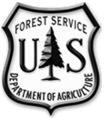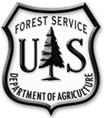|
Kaibab
National Forest For
Immediate
Release – Aug. 10, 2014
McRae Complex: Bob Blasi, 928-606-7491 Sitgreaves Complex: Mark Thibodeau, 928-635-5602; Jackie Banks, 928-635-8314
Managed Fires Near Tusayan Reach Maximum Size;
Sitgreaves Complex Near Parks Has Biggest Day Of Growth
WILLIAMS, Ariz. – The McRae and Hammer fires near Tusayan,
Ariz., that were being managed to benefit the forest have reached their maximum size, treating a total of 14,376 acres and achieving many resource objectives such as consuming accumulations of forest debris, improving wildlife habitat, and reducing the likelihood
of high-severity fires that could threaten neighboring communities.
The Sitgreaves Complex near Parks, Ariz., experienced its single biggest day of growth yesterday, reaching a total size of 10,201 acres. Fire managers were pleased to be able to quickly accomplish treatment
of a few thousand acres in a single day, thereby lessening the overall duration of the fire and the number of remaining days of smoke impacts to nearby communities. McRae Complex, Tusayan Ranger District
The McRae Fire, which was started by lightning in early July, reached a maximum size of 5,505 acres. There has been minimal fire activity and no measurable fire spread over the last few days. The fire area
will continue to be monitored daily to confirm that all containment lines are holding. The closure that was put into effect to ensure public safety will be lifted Aug. 15. Yesterday, the Hammer Fire reached its final size of 8,871 acres. Crews completed final
management ignitions within the designated planning area and monitored the fire as it spread to fill the boundary lines established for it. Today, fire managers will begin removing fire-weakened hazard trees and putting out hot spots, a technique known as
mopping up, near road edges. There may be some movement of ground fire within containment lines, but it is expected to be minimal. “Managing these fires has been a success story for the Tusayan Ranger District,” said James Simino, district ranger. “We treated
a lot of acres safely and effectively, and we owe thanks to our neighbors and partners for supporting us as we took on this important project and to all the fire crews for their hard work and dedication to the job.” Sitgreaves Complex, Williams Ranger District The Sitgreaves Complex experienced its single biggest day of growth yesterday due to a focused effort by fire managers to use aerial
and hand ignitions to fill in critical gaps within established perimeters. The goal of these management ignitions was twofold, to treat strategically-important areas of Sitgreaves Mountain in advance of impending monsoon activity and to lessen the overall
duration of the fire in order to limit the number of remaining days of smoke impacts to local communities. “We have now treated much of the area on and around the mountain, which is an incredible accomplishment given that Sitgreaves hadn’t seen fire in almost
a hundred years,” said James Pettit, fire management officer for the Williams Ranger District. “The work we are doing will provide benefits to the forest and surrounding communities for many years to come.” Today, crews will hold and strengthen containment
lines established for the fire and will continue management ignitions to fill in small islands of unburned fuels. Monsoon moisture is expected to return to the fire area starting today and continuing into early next week. Additional information, photos and maps are available at the following locations:
Jacqueline C. Banks Public Affairs Officer Kaibab National Forest Office: 928-635-8314 Cell: 928-606-7490 This electronic message contains information generated by the USDA solely for the intended recipients. Any unauthorized interception of this message or the use or disclosure of the information it contains may violate the law and subject the violator to civil or criminal penalties. If you believe you have received this message in error, please notify the sender and delete the email immediately. |
Attachment:
1650-1_so_managed_fires_2014_0810.pdf
Description: 1650-1_so_managed_fires_2014_0810.pdf


